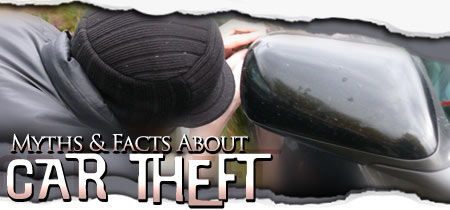
Myths & Facts About Car Theft and How to Avoid It
You
may have already seen tips from your auto insurer or local
police about how to protect your car from theft. Most of
this advice is plain common sense: take your keys and valuables
with you, lock your doors, roll up your windows, avoid parking
in dark places, etc. Unfortunately some "tips"
only perpetuate urban legends from twenty years ago. Car
theft is a multi-billion dollar business run by professionals
that has evolved since the 1980s when it last peaked during
the "crack epidemic". Here are some misconceptions
and facts about car theft today.
MYTH: Car
theft is a non-violent, "one-victim" crime. It's estimated that 90% of all stolen cars are involved
in a secondary crime like robbery, drug transportation and
people smuggling. That works out to about a million secondary
crimes associated with car theft every year. In Canada,
they figure a stolen car is over 200 times more likely to
be involved in an accident than average. A stolen car is
very dangerous.
MYTH: It's
mostly joyriding - no harm no foul. The relatively
few car thieves who do it "just for kicks" are
usually underage or under-the-influence. Twelve-year-old
kids don't know how to drive safely even if they wanted
to. Car thieves on meth know that police are under
orders to avoid high-speed pursuit. So when a police cruiser
is following them, they escape by intentionally driving
recklessly at high speed. With a life expectancy of five
years, a meth addict knows no fear behind the wheel.
MYTH: If
your car is stolen, your insurance will make you whole. If you have ever sold your car to a used car dealer, you
know there is a spread between what he pays you and his
selling price. For most cars, it's 15-25%. Guess, which
amount you'll get from your insurer? You won't get anything
for your inconvenience or mental anguish and don't forget
your deductible. If you lose a $20,000 car, you are probably
out $5,000.
MYTH: A
car alarm or steering wheel lock will stop most car thieves. After years of aggravation, car alarms are now viewed as
a major source of noise pollution. They don't do much to
stop theft either. Most of us ignore them if we can. Dedicated
professionals and tweaking meth addicts alike can disable
alarms in a few minutes. Likewise bypassing a steering wheel
lock requires only a hacksaw and a few minutes. Active anti-theft
devices like "clubs" and "brake locks"
are only effective if you remember to use them.
MYTH: Didn't you see 'Gone in 60 Seconds?' Car thieves are cool. Would you leave your wallet filled with $25,000 in cash in your driveway? From a risk-reward perspective, car theft ranks near the top. It attracts international criminal gangs, most with ties to terrorism, drug dealing and prostitution. Car theft is also a major source of cash flow for drug addicts who cannot hold down a regular job. In the West, police estimate that over 70% of all car thieves are meth addicts. Not cool.
MYTH: Car theft is just not that important compared to "serious" crime. Car theft is the largest property crime in the United States. The Highway Loss Data Institute, a US insurance industry-sponsored organization estimates that the average car theft costs the insurance industry over $6,000. Adding the uninsured out-of-pocket costs to owners and the additional burden on the law enforcement and health care systems, CASI estimates the total cost of an "average" car theft is over $10,000. With over 1.2 million car thefts in 2002, car theft represented a drag of over $12 billion on the US economy and this grows almost every year.
FACT: Car thieves will always be with us. There will always be car thieves, but we can cut their numbers. In Europe, South Africa, Canada and Australia, governments have stiffened relevant regulations on carmakers and owners. The smart keys you see on high-end cars in the U.S. have been mandatory on all cars in Europe for almost 10 years. With widespread uptake of electronic immobilizers and vehicle parts marking systems, car theft has dropped as much as 50% in some countries. Thieves are getting smarter but there are fewer of them. It's just not that great of a business any more. We can do the same with an aggressive program of education, regulation and financial incentives to bring modern automotive security technology to the U.S. Until then, take the common sense advice and look out for your car. |